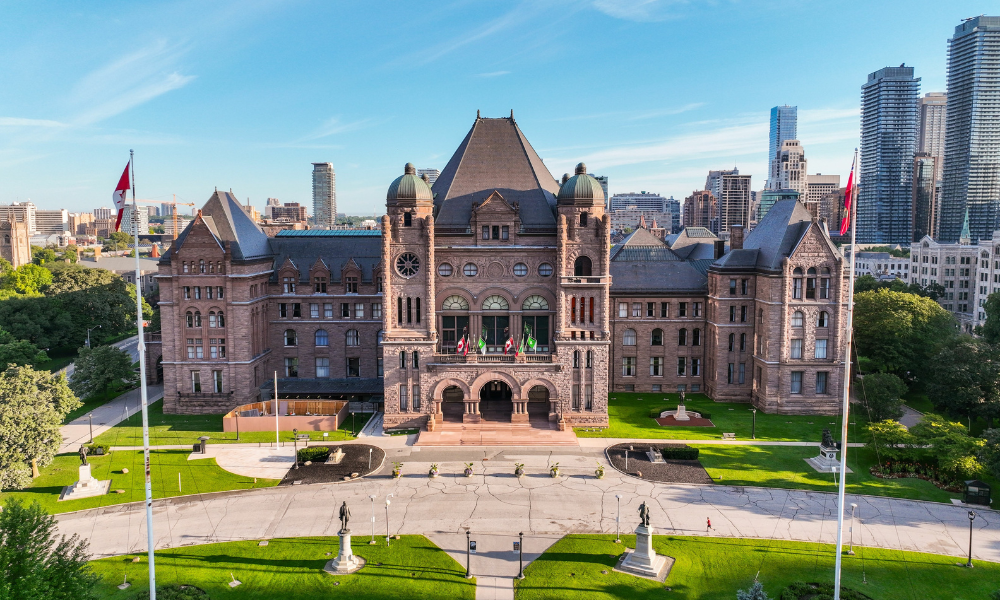
'We're helping Canada unlock up to $200 billion in economic potential and standing shoulder to shoulder to protect the future of Canadian workers'

The Ontario government has signed Memorandums of Understanding (MOUs) with three provinces to reduce internal trade barriers.
Ontario Premier Doug Ford, alongside Saskatchewan Premier Scott Moe, signed an agreement aimed at boosting both provincial economies by enhancing competitiveness and dismantling trade barriers within Canada.
"With President [Donald] Trump taking direct aim at Canada’s economy, we need to do everything we can to protect Ontario and Canadian workers by supercharging our own internal trade opportunities," said Ford.
"Together, we’re building a more competitive, more resilient and more self-reliant economy."
According to the Ontario government, the annual value of interprovincial trade between Ontario and Saskatchewan in 2021—the most recent data available—was $15 billion.
The Saskatchewan government emphasized that trade constitutes approximately 70% of the province’s gross domestic product.
"Now is the time to take strong action to strengthen trade across Canada," said Moe. "Our province remains committed to removing restrictive barriers that limit the flow of trade. Today's MOU between Saskatchewan and Ontario is just one of the ways we are unlocking the infinite potential that exists within our industries from coast to coast."
Recently, Nova Scotia announced its plans to make legislative changes to eliminate interprovincial trade barriers within its jurisdiction.
Ford also met with Alberta Premier Danielle Smith and Prince Edward Island Premier Rob Lantz to sign MOUs aimed at boosting economic growth across all three provinces by advancing efforts to remove trade barriers within Canada.
"By signing these agreements and working together, we’re helping Canada unlock up to $200 billion in economic potential and standing shoulder to shoulder to protect the future of Canadian workers across the country, not just in Ontario," said Ford.
In 2021, Ontario’s interprovincial trade was valued at $62.4 billion with Alberta and $1.8 billion with Prince Edward Island.
"Together, Alberta and Ontario are taking a big step toward a more open, competitive and united economy," said Smith. "This agreement is about getting results, making it easier for people to work, do business and grow across provincial lines. It’s time to stop letting outdated rules hold us back and show Canadians what real economic leadership looks like."
"With our reciprocal Interprovincial Trade and Mobility Act, we’re not just keeping pace—we’re setting the standard and securing our future," said Moe. "Prince Edward Island has unified this nation before and by eliminating unnecessary trade barriers and streamlining labour mobility, we’re fostering a more unified and competitive national economy. Our collaboration with Ontario underscores our commitment to one Canadian economy. Together, we’re proving that when provinces work in concert, the entire nation thrives."
In 2023, Ontario exported $183.9 billion in goods and services to other provinces and territories, and imported $142.7 billion—resulting in two-way trade of $326.6 billion and a trade surplus of $41.2 billion.
In May, Ontario and Manitoba also signed an MOU to support the removal of interprovincial trade barriers between the two provinces.
However, calls for the removal of interprovincial trade barriers may not be as good a solution as promised, according to a previous report from the Canadian Centre for Policy Alternatives (CCPA).
“The attempts to remove so-called interprovincial trade barriers is mostly a push for ‘mutual recognition’ of regulations – a process by which all provinces could be forced to accept the least stringent regulations for safety, environmental protection, and consumer protection,” said Marc Lee, senior economist at CCPA.
“It is a way of attacking provinces’ ability to pass laws for environmental, worker, and consumer protection.”
Meanwhile, the Canadian Federation of Independent Business (CFIB) has called on federal, provincial, and territorial governments to remove key barriers to labour mobility.